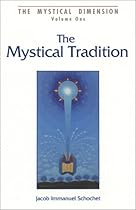 Summary. The following reading provides an insight into Jewish Mysticism.
Summary. The following reading provides an insight into Jewish Mysticism.
Excerpts from The Mystical Dimension
Volume 1 (of 3) The Mystical Tradition
by Jacob Immanuel Schochet (Pages 26-30)
An objective view and appreciation of mysticism needs first and foremost an opening of the mind, a sincere and complete commitment to the pursuit of truth, no less than one must be prepared to give to the study of any other branch of knowledge. An appreciation of mysticism may require a reorientation of thought and attitude from what we are attuned to by a background and approach that focuses completely on practicality and empirical understanding.
With the Kabbala and Chassidism one does not enter a new or different world but a new and different dimension of one and the same world, a different plane of thought that transcends previously held modes and categories.
One must cast away the prejudices imposed by rationalism and scientism. At the very least one must allow a measure of admissibility to the possibility of an order of reality that is not our normative phenomenal one, and allow the possibility of methods of perception that differ from our usual ones. This will indeed reduce our phenomenal world to no more than a partial reality; but surely it would be highly unscientific to deny these possibilities. The sincere pursuit of true knowledge is subject to a sense of humility. There must be a willingness to surrender the ego of self-assurance and to override personal bias.
… in attempting to establish his type of uniformity, the modern rationalist paradoxically creates, in effect, an increasingly disturbing pluralism and an alienating divisiveness. Even as he converts the universe into a mammoth machine, he breaks it up into innumerable particles, separate from and non-related to one another. His physiomonistic pantheism concerns itself only with species and universals. Individual identities become sacrifices for the sustenance of his deus in machina. The human individual (as well as any other particulars) diminishes in proportion to the growth of nature and the universe in the scientific, experimental grasp or consciousness. Human individual life is hedged in by a precarious day-to-day, here-and-now, existence. Some may take this as a stark fact of life.
There is, however, an intuitive categorical and transcending sense of morality deeply embedded in the soul and mind of man (and often emboldened by a host of empirical facts) which revolts against this callous materialism which leaves us with nothing but barren factualism. The resulting tension between the haunting Lorelei of modern rational inquiry and the groping attempts at human self-assertion lies at the root of many, if not all, of our present-day neuroses and vexations, and “he that increases knowledge increases pain.”
The apparent alternatives are resignation or rejection: resignation to the admittedly frustrating paradox, and making the best of it, or the elimination of either the modern method or the recognition of individuality. Obviously, neither of these choices is satisfactory. At this point mysticism offers a viable solution, a new approach. No doubt that this accounts for the recent popularity of mysticism, in both legitimate and illegitimate forms. From our point of view, however, this viable alternative is at best an incidental fringe-benefit. Jewish mysticism did not come into being to be a panacea for social, mental or emotional problems. As already stated, it is an integral part of Torah, an authentic part of Divine Revelation and instruction. It is part of the tradition that is subject to the mitzvah of talmud Torah, the study of Torah, both as an end in itself as well as to enlighten and ennoble man, to guide us along the path of the Divinely intended human self-realization and self-perfection.